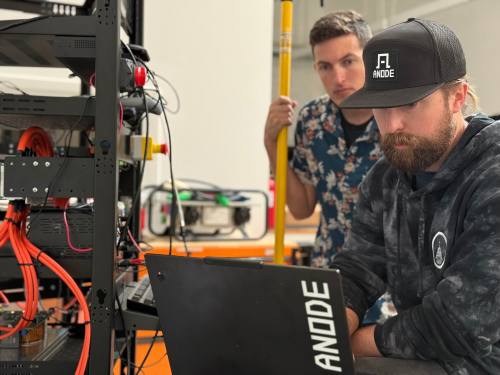Just over a year ago, Moxion Power closed its doors, adding its name to a list of high-profile bankruptcies that affected the climate tech world. The portable battery startup had raised more than 110 million dollars in a bid to replace diesel generators at festivals and construction sites, but even that significant funding was not enough to help it survive the difficult startup phase known as the valley of death. Moxion laid off more than 400 employees and its assets were liquidated.
Now, the startup’s co-founder, Paul Huelskamp, and several former Moxion employees are back with another startup named Anode Technology Company. They hope to accomplish the same goal, ideally without repeating the same mistakes. Huelskamp, now Anode’s CEO, stated that they started Anode to finish what they started.
Anode has been operating quietly but is now emerging with 9 million dollars in seed funding. The round was led by Eclipse, and its partner Jiten Behl, who spearheaded the deal, was previously Rivian’s chief growth officer. Behl’s interest in the space was sparked by his experience at Rivian, which once had an agreement to sell electric delivery vans to Amazon. The companies realized the main problem was not the cost of the vans but the lack of charging infrastructure, as depots do not have the mini power plants needed to charge large fleets.
In a pinch, many fleets turn to diesel generators. Businesses are actually looking for grid-independent solutions that can provide them flexibility. Other companies provide EV charging using mobile batteries, but Huelskamp claims Anode’s integrated hardware should set it apart. The company has designed an inverter for its target markets, including EV charging, construction sites, and live events.
Anode’s mobile battery is also slightly smaller than Moxion’s unit, which makes it easier to load onto flatbed trucks. The company is optimizing for the lowest cost of delivered energy by considering how much energy can be transported per truck and how many trips are required. Huelskamp noted that a smaller footprint might paradoxically allow for more energy on a single truck, a logistical nuance they did not fully appreciate at Moxion.
A key difference from Moxion is that the new startup will use contract manufacturers to make its batteries, learning that it is very tough for a startup to handle all manufacturing in-house. For investor Jiten Behl, those past lessons were a draw, as he benefits from those learnings without having to pay for them.
While EV charging depots are an emerging market, construction and live events are more established industries that currently rent fossil fuel-powered generators. These generators are costly and inefficient compared to large power plants. Huelskamp believes this inefficiency gives Anode an opening, as they can charge their batteries at a much lower cost per kilowatt-hour than what the industry currently pays.
Huelskamp said Anode will use AI to optimize its operations, including charging and delivery. Over time, as they scale up operations and create efficiencies, they aim to drive down the cost of delivered energy close to parity with electricity from the grid, leveraging continued declines in battery costs.

